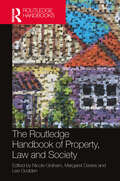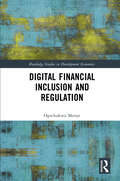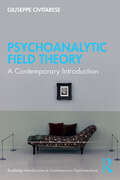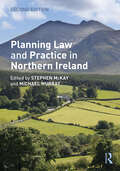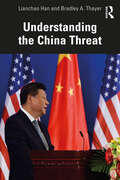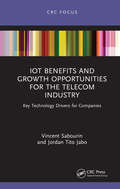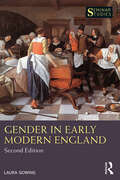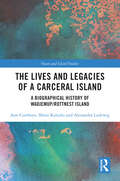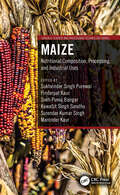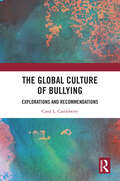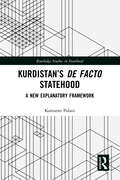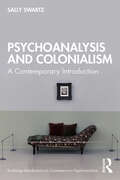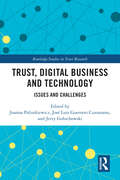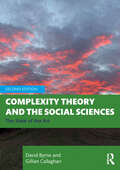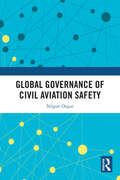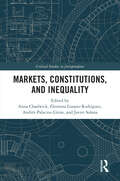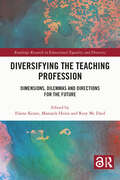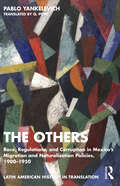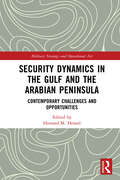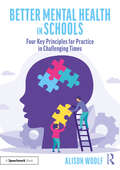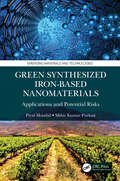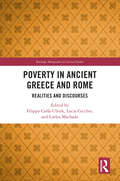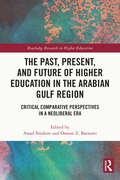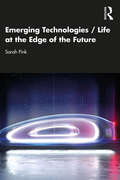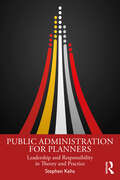Special Collections
Benetech’s Global Certified Accessible Titles
Description: Benetech’s GCA program is the first independent third-party EPUB certification to verify ebook accessibility. By creating content that is born accessible, publishers can meet the needs of all readers. Learn more: https://bornaccessible.benetech.org/
- Table View
- List View
The Routledge Handbook of Property, Law and Society
by Nicole Graham, Margaret Davies and Lee GoddenThis handbook brings together diverse perspectives, major topics, and multiple approaches to one of the biggest legal institutions in society: property. Property touches on many fundamental human questions. It involves decisions about power, economy, morality, work, and ecology. It also involves ideas about where humans fit in the world and how humans relate to more-than-human life. This book will ask in myriad ways such questions as: what property means, what kinds of property there are, what is and should be the relationship between owned and owner, and what is the impact of different forms of property on life in this world? Drawing on a range of socio-legal and empirical methodologies, renowned scholars and rising stars in property from around the world present current issues and map future directions in research. Coming from the place of law but reaching out through cognate disciplines, this handbook provides a comprehensive and accessible survey of current research at the interface of property, society, and the environment. This handbook will appeal to students and researchers across a range of disciplines, including law, sociology, geography, history, and economics.
Digital Financial Inclusion and Regulation
by Ogochukwu MonyeThis book explores the various considerations for achieving an effective regulatory strategy to improve financial access and usage in Nigeria and beyond. Gaps in the legal and institutional framework for digital financial services (DFS) as well as the barriers that contribute to financial exclusion are identified as are the policy changes needed to provide more extensive, accessible and sustainable financial inclusion value. In addition, the book covers divergent themes around the use of and insights for regulating industry financial services providers and challenger entities that herald industry disruption. The book adopts three research methods. The doctrinal research method is used to buttress the law and development analysis and the themes around regulation, adoption and usage of financial services. To elucidate the application of financial innovations, comparative case studies are drawn from selected jurisdictions including Kenya, South Africa, Ghana, The Philippines, Brazil, Mexico, Uganda, Pakistan, India, and Bangladesh. Lastly, using the empirical research method, the author reports the burden experienced by the residents of a community without banks in accessing finance. Included in this discussion are the barriers to finance as well as the coping strategies adopted by the community residents to access formal and informal finance.
Psychoanalytic Field Theory
by Giuseppe CivitareseWritten by one of the world’s renowned Bionian Field Theory scholars, this foundational volume provides a thorough introduction to all facets of psychoanalytic field theory, one of the most lively and original currents of thought in contemporary psychoanalysis, to offer new answers to age-old questions around how psychic change occurs. With clinical examples to illuminate key themes of therapeutic effectiveness, current controversies, and future developments, the book presents a radically intersubjective view of the analytic process that focuses on the plane of unconscious communication common to both analyst and patient, moving beyond the I/you division to access the shared substance of the psyche. It centers the unconscious not as a hellish region of the psyche but as an important function of the personality that gives meaning to emotional experience. Offering clear expositions of complex concepts and linking to more detailed sources of information, this book is important reading for all clinicians, trainees, and students interested in contemporary psychoanalysis.
Planning Law and Practice in Northern Ireland
by Stephen McKay and Michael MurrayEach of the jurisdictions within the United Kingdom is constantly refining the operational characteristics of its planning system and while there are some common practices, there are also substantive divergences. In each territory the planning template is shaped within a dynamic political and legal context and thus students and practitioners require an accessible, in-depth and up-to-date literature dealing with this matter. The multi-disciplinary contributors to this expanded Second Edition of Planning Law and Practice in Northern Ireland explore the progression of planning within the region and discuss prominent facets of contemporary development management, development plans, environmental law, property law and professional practice. Consideration is given to the consequences of Brexit for planning in Northern Ireland, devolved government institutional structures for planning, and the post-2015 emergent performance of local authorities in this arena. The book makes an important contribution to the wider literature in this field and, with its extensive citing of statutes and cases, provides an essential resource for students, planning practitioners and researchers.
Understanding the China Threat
by Bradley A. Thayer and Lianchao HanThis book examines the contours of the U.S.–China confrontation and its future trajectories. It delineates the two major causes of the friction in Sino-American relations—change in the balance of power in China’s favor and the conflicting ideologies of the two states—and emphasizes why it is imperative for the U.S. to hold on to its ideological principles. It demonstrates the ultimate and irreconcilable gap in the visions the two competitors have for international politics and consequently why conflict—certainly cold, and very possibly hot—is inevitable. The authors also suggest measures which the U.S. can adopt to sustain its leadership and deter China’s ideology and vision for the future of global politics. A significant contribution to the study of Sino-American relations, the volume will be of interest to scholars and researchers of international relations, foreign policy, and U.S. and Chinese politics. It will be of great interest to think tanks, public policy professionals, and the interested general reader.
IoT Benefits and Growth Opportunities for the Telecom Industry
by Vincent Sabourin and Jordan Tito JaboThis critical and forward-looking book features: An assessment of the impact of Internet of Things (IoT) on the telecom industry’s revenue streams IoT-based business models in the telecom industry A PESTLE (political, economic, socio-cultural, technological, legal, and environmental) analysis of the industry in relation to IoT Key technological drivers. It also features a case study of Bell Canada Enterprises (BCE) Inc., which highlights IoT-based business models in the industry. The study reveals that telecom operators have started implementing IoT projects, however, true revenue streams are yet to materialize. Ten IoT-based business models have been identified at BCE Inc. The book points out that operators do leverage existing infrastructure in terms of broadband fiber and mobile connectivity in part and resort to partnerships and acquisitions to acquire much-needed knowledge, technology, and smart devices. Concerning the effect of IoT on the telecoms’ revenue streams, it was revealed that new entrants, who are not necessarily in the telecom industry, have impacted the old players’ revenue streams. OTT services like YouTube, WhatsApp, IPTV, Netflix, are the biggest culprits. Seven key technological drivers for IoT have been identified and include widespread wireless connectivity, the availability and affordability of microcontrollers, sensors and actuators, the decreasing cost of bandwidth, the recent implementation of IPv6, and the ongoing development of 5G network, as well as the use of cloud computing and analytics. Finally, the PESTLE analysis of the industry shows that the lack of a comprehensive political and regulatory framework still slows down IoT deployment. Interoperability, security, and privacy concerns are other constraints. Conversely, general economic conditions in most developed and developing economies are favorable to the advancement of IoT technology. Governments are willing to subsidize R&D and have partnered with the private sector to speed up the roll-out process.
Gender in Early Modern England
by Laura GowingThis concise and stimulating book explores the history of gender in England between 1500 and 1700. The second edition has been thoroughly revised to include new material on global connections, masculinity and recent historiography. Amid the upheavals of the Reformation and Civil Wars, gender was political. Sexual difference and women’s roles were matters of public debate, while social and economic changes were impacting on work, family and marriage. The rich archives of law, state and family testify to the complex configurations of patriarchal order and resistance to it. Gender in Early Modern England provides insight into gender relations in a time when a stark hierarchy of gender co-existed with a surprising degree of female capacity, great potential for challenge and confrontation, and a persistent sense of the mystery of the body. Documents include early feminist argument, law, midwives’ books, recipes, protest, sexual insults, cross-dressers, women escaping slavery, royal favourites and petitions. With a chronology, who’s who, glossary, guide to further reading and previously unpublished archival documents, Gender in Early Modern England is the perfect resource for all students interested in the history of women and gender in England between 1500 and 1700.
The Lives and Legacies of a Carceral Island
by Ann Curthoys and Shino Konishi and Alexandra LudewigThis book is a biographical history of Rottnest Island, a small carceral island offshore from Western Australia. Rottnest is also known as Wadjemup, or ‘the place across the water where the spirits are’, by Noongar, the Indigenous people of south-western Australia. Through a series of biographical case studies of the diverse individuals connected to the island, the book argues that their particular histories lend Rottnest Island a unique heritage, in which Indigenous, maritime, imperial, colonial, penal, and military histories intersect with histories of leisure and recreation. Tracing the way in which Wadjemup/Rottnest Island has been continually re-imagined and re-purposed throughout its history, the text explores the island’s carceral history, which has left behind it a painful community memory. Today it is best known as a beach holiday destination, a reputation bolstered by the ‘Quokka selfie’ trend, the online posting of photographs taken with the island’s cute native marsupial. This book will appeal to academic readers with an interest in Australian history, Aboriginal history, and the history of the British Empire, especially those interested in the burgeoning scholarship on the concept of ‘carceral archipelagos’ and island prisons.
Maize
by Sukhvinder Singh Purewal, Pinderpal Kaur, Sneh Punia Bangar, Kawaljit Singh Sandhu, Surender Kumar Singh and Maninder KaurMaize is widely cultivated throughout the world due to its high-yield potential. The economic and nutritional value of maize grains is associated with its starch content, protein, fibre, bioactive compounds, and minerals. Maize is used worldwide in the preparation of health-benefiting, antioxidant-rich, fortified products and dietary supplements. Maize: Nutritional Composition, Processing, and Industrial Uses explores the status of maize in terms of its production, nutritional composition, biofortification, processing methods, health benefits, maize-based products, and storage. This book also emphasizes the key features of maize grains which make it an ideal crop for industrial use. It covers all aspects of recent research about the maize and provides updated information. Features Discusses information related to chemistry of maize components Highlights comprehensive information on the physical and milling properties of maize Explains the structure, functional, and antioxidant properties of maize flour Provides the latest scientific development in the modification of maize starch Explores various maize-based food products and their storage Examines maize protein, scenarios, and quality improvement through bio-fortification In-depth information is provided regarding various health-benefiting nutrient components of maize flour, offering meaningful information for product formulation. This book unfolds the potential of maize grains for industrial use.
The Global Culture of Bullying
by Carol CastleberryThis book explicates “bullying” as a concept and as a social and cultural phenomenon that has become a defining reality of the times in which we live. The author begins in the arena where it is first, and most acutely individually, experienced—in school—and expands to other institutions and areas of social life—the family, the workplace, and the local, national, and international spheres, extending the concept of bullying to the global arena to uncover the social and institutional root causes of the extreme forms of bullying such as trafficking, torture, terrorism, and genocide. The book discusses the steps taken to address these issues and analyzes their efficacy. It explores the concept of epigenetics, brain development, childhood experiences, and other psychological factors that contribute to bullying behaviors and predispositions. The book investigates and compares anti-bullying and anti-violence initiatives taken particularly in the U.S, the U.K., and India to address the issue and create community-wide resilience practices. It also describes the current trends in decisions from international, regional, and domestic law, and offers evidence-based policy recommendations to establish a culture of respect for human dignity. An interdisciplinary, intercultural exploration, and analysis of the phenomenon of bullying, this book will be of interest to students, teachers, and researchers of psychology, sociology, anthropology, social justice and law, human rights, and cultural studies. It will also be useful for academic libraries, academicians, policy planners, school administration, government officials, and readers interested in reading about bullying.
Kurdistan’s De Facto Statehood
by Kamaran PalaniThis book explains the dynamics and nature of Iraqi Kurdistan’s de facto statehood since its inception in 1991, in particular the vicissitudes de facto independence since then. The work examines de facto statehood in Kurdistan, and uncovers the dynamics of de facto statehood in Kurdistan at internal, national and international levels. Kurdistan’s de facto statehood is shown to be inherently characterised by fluidity. In this book, fluidity is defined as a highly unstable feature of de facto statehood in the relational context of non-recognition. The book includes interviews with a number of high-profile politicians and policy makers from the region. These provide unique insights into such issues as the four main factors at play in the fluidity of the de facto state of Kurdistan: the balance of power between Erbil and Baghdad; the level and form of internal fragmentation; the change of strategies to gain international recognition; and the uncertain and fluctuating external support. This book will be of much interest to students of statehood studies, Middle Eastern politics, and International Relations.
Psychoanalysis and Colonialism
by Sally SwartzWithin this important and insightful book, Sally Swartz introduces readers to early entanglements of psychoanalytic theory with colonialism and how it has led to significant and long-lasting implications for psychoanalysis. Psychoanalysis and Colonialism is unique in drawing together a wide array of sources and a span of history from the beginnings of psychoanalysis to current theory and practice. The book explores ways in which Freudian theory incorporated the idea of the primitive into the centre of mapping the untamed territories of the unconscious, via notions of taming instinctual excess, civilizing the primitive and conquering and bringing order to wildness. The text describes the influences of colonialism on the thinking of Freud and Jung and goes on to describe anti-colonial voices, including Césaire and Mannoni, Memmi and Fanon, and their contribution to psychoanalytic theory. It concludes with thoughts on the challenges of decolonizing psychoanalysis. This book is an accessible account of the links between colonialism and psychoanalysis and is suitable for general readers with an interest in the topic, as well as all psychoanalytic practitioners grappling with the ways in which issues of race, class, gender and sexuality affect their ways of working and writing.
Trust, Digital Business and Technology
by Joanna Paliszkiewicz, Jose Luis Guerrero Cusumano, and Jerzy GołuchowskiTrust, Digital Business and Technology: Issues and Challenges presents and discusses the main issues and challenges related to digital trust and information technologies. The subject of trust is relevant to both practitioners and researchers. It is widely recognized and confirmed that trust, especially mutual trust, when it is built at the right level, reduces the risk of interaction and increases the collaboration between partners. Readers will gain from this book theoretical and practical knowledge on digital trust; theoretically, well-grounded knowledge on digital trust and related concepts, empirically validated by practice. Most authors have taken innovative approaches to consider issues highlighting a selected aspect of the core theme of this book. The intended audiences of this book are professionals, scholars, and students.
Complexity Theory and the Social Sciences
by David Byrne and Gillian CallaghanThis expanded and updated edition of Complexity Theory and the Social Sciences: The State of the Art revisits the use of complexity theory across the social sciences and demonstrates how complexity informs approaches to various contemporary issues in the context of the COVID-19 pandemic, widening social inequality, and impending social and ecological catastrophe wrought by global warming. The book reviews complexity theory in the practice of the social sciences and at their interface with ecological science. It outlines how social theory can be reconciled with complexity thinking and presents a review of the way research can be done using complexity theory. The book suggests how complexity theory can be used to understand and evaluate governance processes, particularly with regard to social inequality and the climate crisis. The impact of the COVID-19 pandemic is also examined through a complexity lens, reviewing how complexity thinking has been employed in relation to the pandemic and how implementing a complexity framework can transform health and social care. The book concludes with a call to action and the use of complexity theory to inform critical thinking in the education system. This textbook will be immensely useful to students and researchers interested in social research methods, social theory, business and organization studies, health, education, urban studies, and development studies.
Global Governance of Civil Aviation Safety
by Nilgun OzgurThis book indicates the shortcomings of the current international legal system and customary international norms that govern international aviation law to comply with contemporary air transport market realities. As the air transport market develops globally, the safety regime of civil aviation should also be governed and applied globally. In this book, the author departs from current international legal norms to examine the emerging legal field of global administrative law. Through that lens, the possibility of reconstructing the set of legal mechanisms that govern domestic and international administrative interaction in the global field of aviation safety is explored. This book demonstrates that a legal system is never complete but always develops in tandem with changing needs, i.e. the participation of the affected parties. Exploring the principles of GAL theory contributes to addressing the contemporary legal issues relating to state compliance with international aviation safety standards that would otherwise not be covered by customary international law. In particular, the principles of GAL theory regarding global governance and the ‘public’ character of global regulations, the role of individuals and states in global governance, and state sovereignty are considered valuable contributions to contemporary global aviation safety issues in practice. It is asserted in this book that proper checks and balances in global aviation safety can be improved by making these accessible to individuals by way of national courts. Finally, establishing public awareness of global aviation safety standards will eventually create greater pressure on states to implement and enforce them. This book is in an area increasing academic and research interest of practitioners of public international aviation law, global administrative law, global governance, and global aviation safety, global air transport market regulations.
Markets, Constitutions, and Inequality
by Anna Chadwick, Eleonora Lozano-Rodríguez, Andrés Palacios-Lleras, and Javier SolanaThis interdisciplinary collection examines the significance of constitutions in setting the terms and conditions upon which market economies operate. With some important exceptions, most notably from the tradition of Latin American constitutionalism, scholarship on constitutional law has paid negligible attention to questions of how constitutions relate to economic phenomena. A considerable body of literature has debated the due limits of the exercise of executive and legislative power, and discussions about legitimacy, democracy, and the adjudication of rights (civil and political, and socioeconomic) abound, yet scant attention has been paid by constitutional lawyers to the ways in which constitutions may protect and empower economic actors, and to how constitutions might influence the regulation and governance of specific markets. The contributors to this collection mobilize insights from other disciplines – including economic theory, history, and sociology – and consider the relationship between constitutional frameworks and bodies of law – including property law, criminal law, tax law, financial regulation, and human rights law – to advance understanding of how constitutions relate to markets and to the political economy. This book’s analysis of the role constitutions play in shaping markets will appeal to scholars and students in law, economics, history, politics, and sociology.
Diversifying the Teaching Profession
by Elaine Keane and Manuela Heinz and Rory Mc DaidThis edited volume is about diversifying the teaching profession. It is unique in its inclusion of multiple dimensions of diversity; its chapters focus on a wide range of under-represented groups, including those from lower socio-economic groups, Black and minority ethnic groups, migrants, the Travelling community, the Deaf community, the LGBTQI+ community and those of mature age. The book includes contributions from Australia, England, Iceland, Portugal and Scotland, as well as a number of chapters from the Irish context, mostly emanating from projects funded under Ireland’s Higher Education Authority’s Programme for Access to Higher Education (PATH): Strand 1—Equity of Access to Initial Teacher Education. The book also critically engages the rationale for diversifying the profession, arguing not only that representation still matters, but also that ultimately teacher diversity work needs to encompass system transformation to achieve a diverse, equitable and inclusive teaching profession.
The Others
by Pablo YankelevichThe Others reconstructs the history of migration and naturalization of foreigners in Mexico during the first half of the twentieth century. Despite never receiving large influxes of foreigners, paradoxically Mexico has applied particularly tight controls on migration and naturalization. Why did it choose to limit the arrival of foreigners when their numbers were so low as a proportion of the total population? In a nation riven by ethnic prejudices and with post-revolutionary governments swift to criticize racial discrimination, what can explain the strong racialization of naturalization and migration policies? First published in Spanish, this award-winning book sheds light on the origins of many migration-related problems still plaguing the Mexican government: irregular migration to the United States, the lack of any genuine control over the arrival and residence of foreigners in Mexico, immigration and naturalization red tape, the authorities’ corruption and arbitrary decisions, racism, and discrimination in its migration policy. These are all issues overlooked by historical research in Mexico and explored in depth for the first time here. This book will be invaluable to students and scholars of Mexican history, borderland studies, and those interested in the relationship between the United States and Latin America.
Security Dynamics in The Gulf and The Arabian Peninsula
by Howard M. HenselThis book focuses on security dynamics in the contemporary Gulf and Arabian Peninsula. It highlights the development of the Gulf and the Arabian Peninsula, the contemporary challenges and opportunities confronting the principal powers that are active in this important sub-region, and analyzes and evaluates their policy responses. The various perspectives of the chapters all suggest that the stability and security of the Gulf sub-region is now and will continue in the future to be of vital importance to the global community. The chapters that compose the volume are organized into three thematic sections. Part I, ‘Security Challenges and Power Configurations in the Gulf and the Arabian Peninsula: The Historical Context’, comprises three chapters. Part II, consisting of seven chapters, is entitled, ‘Contemporary Security Challenges and Opportunities in the Gulf and the Arabian Peninsula.’ Part III, ‘Contemporary National Interests, Objectives, and Strategies of the Major Powers in the Gulf and the Arabian Peninsula’, comprises five chapters. Finally, the volume ends with a concluding chapter. Unfortunately, the contemporary unstable, heterogeneous Gulf sub-region is fraught with extremely serious and often urgent challenges that threaten the sub-region’s security. This volume helps to illuminate the nature of the sub-regional environment and the contemporary challenges and opportunities that confront the various powers that are active in the Gulf. It also contributes to a greater understanding of the interests, contemporary objectives, and strategies of those powers as they formulate and implement policies in response to the challenges and opportunities that they confront. This book will be of much interest to students of security studies, Middle Eastern politics and International Relations.
Better Mental Health in Schools
by Alison WoolfBetter Mental Health in Schools recognises the value of school staff in supporting mental health in children and young people and introduces new skills for enhancing the therapeutic benefits of environments and relationships in schools. This book discusses and links to provision in schools and to supporting good mental health in pupils across four key areas for enhancing mental health and wellbeing — Cognition, Compassion, Containment, and Connection. Based in relevant and timely research it provides an accessible insight into practical ways to change practice. Rather than prescribe one programme, or suggest one curriculum design, the book shows how strengthening knowledge and understanding of some basic underpinnings of good mental health will scaffold the development of better mental health in schools and offers illustrations of how that could look in everyday practice. Written for practitioners and based on many years of experience in classrooms across a variety of education provisions, this book reflects the lived, experiential perspective of a teacher and school therapist. Through paying attention to these four key areas of daily life in school, staff can create an environment that supports mental wellbeing, while not depleting their own mental health.
Green Synthesized Iron-based Nanomaterials
by Mihir Kumar Purkait and Piyal MondalThis book covers different green approaches used for the preparation of iron-based nanoparticles and their environmental remediation applications. It investi-gates various environmental applications such as antimicrobial studies, dye and heavy metal removal, and wastewater pollutant degradation by various green syn-thesized iron nanomaterials. Critical analysis of different routes and the sepa-ration techniques of iron-based nanomaterials along with the potential impacts of iron nanoparticles on human health and the atmosphere are also discussed. Overall, the authors: Summarize all the basic aspects of synthesis and application of iron-based green nanomaterials Explain morphological parameters of the prepared nanomaterials obtained from different routes and their specific applications Include different separation techniques from an industrial point of view Exclusively cover specific environmental remediation applications Discuss the future scope and challenges of green processes This book is aimed at researchers and professionals in chemical and environmental engineering, materials science, and nanotechnology.
Poverty in Ancient Greece and Rome
by Filippo Carlà-Uhink, Lucia Cecchet, and Carlos MachadoThis volume presents an innovative picture of the ancient Mediterranean world. Approaching poverty as a multifaceted condition, it examines how different groups were affected by the lack of access to symbolic, cultural and social – as well as economic – capital. Collecting a wide range of studies by an international team of experts, it presents a diverse and complex analysis of life in antiquity, from the archaic to the late antique period. The sections on Greece, Rome, and Late Antiquity offer in-depth studies of ancient life, integrating analysis of socio-economic dynamics and cultural and discursive strategies that shaped this crucial element of ancient (and modern) societies. Themes like social cohesion and control, exclusion, gender, agency, and identity are explored through the combination of archaeological, epigraphic, and literary evidence, presenting a rich panorama of Greco-Roman societies and a stimulating collection of new approaches and methodologies for their understanding. The book offers a comprehensive view of the ancient world, analysing different social groups – from wealthy elites to poor peasants and the destitute – and their interactions, in contexts as diverse as Classical Athens and Sparta, imperial Rome, and the late antique towns of Egypt and North Africa. Poverty in Ancient Greece and Rome: Discourses and Realities is a valuable resource for students and scholars of ancient history, classical literature, and archaeology. In addition, topics covered in the book are of interest to social scientists, scholars of religion, and historians working on poverty and social history in other periods.
The Past, Present, and Future of Higher Education in the Arabian Gulf Region
by Awad Ibrahim and Osman Z. BarnawiThis edited volume contributes a novel understanding of the past, present, and future of higher education across the six countries which make up the Gulf Cooperation Council (GCC). Against the backdrop of intense political, ideological, and epistemological disruptions across the Arabian Gulf Region over the last two decades, this volume adopts critical comparative perspectives in order to chart the history, present day, and future realities of higher education in Saudi Arabia, the United Arab Emirates, Oman, Qatar, Bahrain, and Kuwait. By focusing on dynamics relating to neoliberalism, and using the notions of ‘tensionality’ and ‘locality’ to situate topics such as curricula, policies, practices, the volume engages with current discourses, controversies, and themes such as the internationalization and marketization of high education in these countries. In doing so, the book offers a theoretical framework to enable greater understanding of the contemporary functioning of higher education in the Arabian Gulf Region. This text will benefit scholars, academics, and students in the fields of higher education and international and comparative education more broadly. Those involved with educational policy and politics, and Middle Eastern studies in general will also benefit from this volume.
Emerging Technologies / Life at the Edge of the Future
by Sarah PinkEmerging Technologies / Life at the Edge of the Future invites us to think forward from our present moment of planetary, public and everyday crisis, through the prism of emerging technologies. It calls for a new ethical, responsible and equitable path towards possible futures, curated through in-depth engagement with and across experiential, environmental and technological possibilities. It tackles three of the most significant challenges for contemporary society by asking: how emerging technologies are implicated in the sites of everyday lives; what place emerging technologies have in an evolving world in crisis; and how we might better imagine and shape ethical, equitable and responsible futures. The book interweaves three narratives, each of which advances three sets of concerns for our societal futures: ‘Emergence’, which addresses futures, trust and hope; ‘Worlds’, which addresses data, air and energy; and ‘Technologies’, which addresses the future of mobilities, homes and work. Not simply a critical study of emerging technologies, this book is also an approach to thinking and practice in times of global crisis that plays out a mode of future-focused scholarship and action for the first half of the twenty-first century.
Public Administration for Planners
by Stephen KehsThis book offers an introduction to public administration by a veteran practitioner, written for planners, as well as students seeking a public administration career and individuals simply wanting to learn more about responsible government. The narrative provides an overview of public administration theory and the importance of leadership in today’s contentious political environment. The book contains five parts including an introduction, parts on management, the public sector and government programs, and some impressions on why this subject is so critically important in our society today. Typical administrative responsibilities are addressed as well as issues not typically covered in books on public administration, along with observations about sound public administration. Each part also contains practical exercises, discussion questions and references to other texts and academic resources. Because public administration is fundamentally about relationships with people and communities, the book provides lessons that can be applied easily to one’s personal life and experiences. It is a timely narrative on public administration today that will be valuable reading for planners and planning students looking to better understand public administration and policy.
